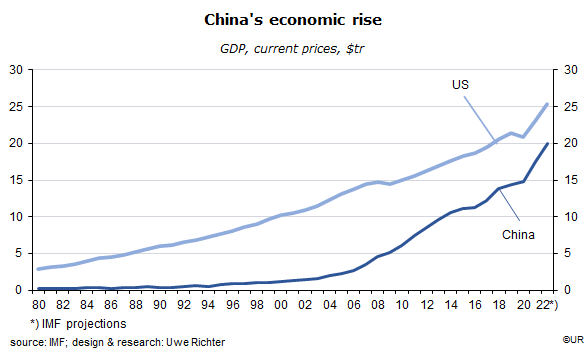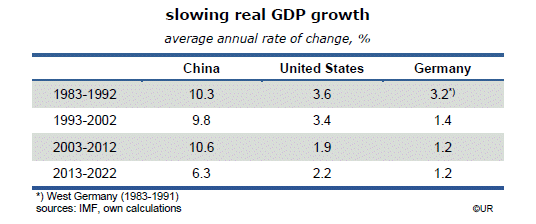Dieter Wermuth, Economist and Partner at Wermuth Asset Management
Economists used to say that if the US sneezed the rest of the world would catch the flu. In the meantime, this is true for China, the biggest player in international trade and soon the biggest economy as well. On the basis of so-called purchasing power parities (which is an artificial exchange rate which differs significantly from the market exchange rate) China is already the number one.

Right now, real GDP growth forecasts of the EU Commission and the IMF are in the order of solid 4 ½ to 5% y/y rates of increase for this year and next. But the most recent Chinese statistics suggest that this may be wishful thinking: industrial production was down 2.9% from one year ago, while retail sales have declined by 11%.
Because of the strictly enforced zero-Covid policies large parts of the country are in lockdown which leads to bottlenecks on the supply side and to rapidly rising inflation rates on a global scale. Herd immunity remains a distant goal. Chinese vaccines are not very effective while imports of better Western alternatives are forbidden. The Corona crisis will therefore not end anytime soon.
On top of this, the government in Beijing, impressed by the effects of Corona and Western sanctions against Russia, is now vigorously pursuing de-globalisation and autonomy, especially in tech. This structural change is already reducing productivity and thus the growth rate of potential GDP.

Even so, China remains the world’s growth engine, at least as long as there are no new military or pandemic shocks which would put all those economic forecasts into the garbage bin. For me, the remarkable resilience of the Chinese economy is mainly the result of very high rates of gross fixed capital formation – at 42% of GDP they are about twice as high as in the US or the EU. China is also leading the world in terms of international patents; they are an indicator of the high quality of the human capital stock.
It is true that much of that investment spending is wasted, especially in infrastructure and housing, but remaining funds are so large that the modernization process can still continue in a very dynamic way. China is in the lead globally in more and more sectors, not only in consumer goods but also, for instance, in wind, solar and battery industries (which are at the core of the fight against climate change), military and space technology. Who or what can stop China? Do we actually want this?
As I mentioned above, China’s near-term outlook is less than bright. Since this is also true for the US, the risk of a global recession seems to be rising. If, as has recently happened, yields of dollar bonds decline while stock markets go down as well, it could be an ominous sign that we are in the late phase of the global business cycle.
Add to this that the Fed is expected by market participants to raise policy rates by another 300 basis points, that US fiscal policies are moving from extremely expansionary to just expansionary and that the high prices of energy and food have a huge negative effect on real household incomes and consumption, the main driver of American demand.
Germany and Western Europe as a whole will not be able to insulate themselves from these developments beyond their borders; the economies are simply linked too closely with each other. Growth will suffer – but inflation will come down as well.
###
For more information please contact:
Instinctif Partners // Lars Hofer
E lars.hofer@instinctif.com
T +49 162 562 8917
Visit us: https://wermutham.com/
Follow us on Twitter and LinkedIn
About Wermuth Asset Management
Wermuth Asset Management (WAM) is a Family Office which also acts as a BAFIN-regulated investment consultant.
The company specializes in climate impact investments across all asset classes, with a focus on EU “exponential organizations” as defined by Singularity University, i.e., companies which solve a major problem of humanity profitably and can grow exponentially. Through private equity, listed assets, infrastructure and real assets, the company invests through its own funds and third-party funds. WAM adheres to the UN Principles of Responsible Investing (UNPRI) and UN Compact and is a member of the Institutional Investor Group on Climate Change (IIGCC), the Global Impact Investing Network (GIIN) and the Divest-Invest Movement.
Jochen Wermuth founded WAM in 1999. He is a German climate impact investor who served on the steering committee of “Europeans for Divest Invest”. As of June 2017, he is also a member of the investment strategy committee for the EUR 24 billion German Sovereign Wealth Fund (KENFO).
Legal Disclaimer
The information contained in this document is for informational purposes only and does not constitute investment advice. The opinions and valuations contained in this document are subject to change and reflect the viewpoint of Wermuth Asset Management in the current economic environment. No liability is assumed for the accuracy and completeness of the information. Past performance is not a reliable indication of current or future developments. The financial instruments mentioned are for illustrative purposes only and should not be construed as a direct offer or investment recommendation or advice. The securities listed have been selected from the universe of securities covered by the portfolio managers to assist the reader in better understanding the issues presented and do not necessarily form part of any portfolio or constitute recommendations by the portfolio managers. There is no guarantee that forecasts will occur.
Read the full article in PDF format here: English.
